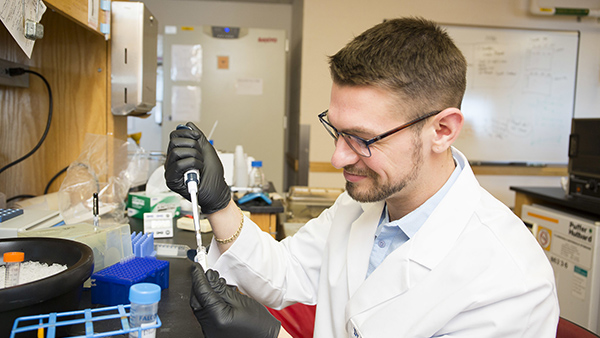Mucosal Immunology and Biology Research Center
Scientists in the Mucosal Immunology and Biology Research Center conduct basic research in mucosal immunology topics.
Researchers at the Mucosal Immunology and Biology Research Center at Massachusetts General Hospital are studying the role of the mucosa—the thin layer of tissue that lines many body cavities—as the first line of defense against pathogenic microbes.

Mucosal immunology is the study of the surfaces of the mucosa—the thin layer of tissue that lines the body cavities in the gastrointestinal, respiratory and urogenital tracts. The mucosa provides the first line of defense in the body’s fight against a range of pathogenic microbes.
The mucosal immune system employs a sophisticated response to invaders, as it can typically distinguish pathogens from beneficial flora and harmless dietary antigens.
When this sophisticated system is unable to distinguish pathogens from innocuous antigens, diseases such as food allergies, inflammatory bowel disease, and celiac disease can result.
By studying the complex molecular mechanisms of mucosal immunology, our researchers are making discoveries that are leading to the development of vaccines, adjuvant and immunotherapeutics to treat disorders arising from these conditions.
The Intestine and the External Environment
The intestine is a major site for the interaction between the host and the external environment. In particular, the intestinal mucosa is continually exposed to a wide variety of non-pathogenic and pathogenic microbes and their toxins. Both immune and non-immune protective mechanisms are involved in the host’s interaction with these environmental stimuli.
The central component of the interaction between luminal microbes and intestinal host defense is the epithelium juxtaposed between the external and internal environments. The enterocyte (an absorptive epithelial cell within the intestine) has been demonstrated to play an active role in intestinal host defense.
For example, in response to microbial colonization or enterotoxin and endotoxin stimulation, the enterocyte can upregulate the transcription of inflammatory cytokines and membrane surface molecules to more effectively participate in mucosal defense.
Currently, we have a limited understanding of how enterocyte immune and inflammatory responses are regulated and what their specific contributions are to the intestinal mucosal host defense in health and disease.
Nonetheless, this area of investigation is extremely important, and many opportunities exist to make breakthroughs that could ultimately lead to new strategies for the prevention and treatment of infectious intestinal diseases as well as autoimmune disorders. Our principal investigators are working on different aspects of these questions.
The Gut’s Epithelium in Intestinal Barrier Function
Our researchers are focusing on the role of the gut epithelium in intestinal barrier function, and how interactions with immune and inflammatory cells (neutrophils and macrophages) via cytokine release influence the epithelial barrier’s response to microbial luminal stimuli.
GEMMA Study
Mass General has launched the GEMMA study to learn more about the many factors that contribute to the development of autism spectrum disorder (ASD).

